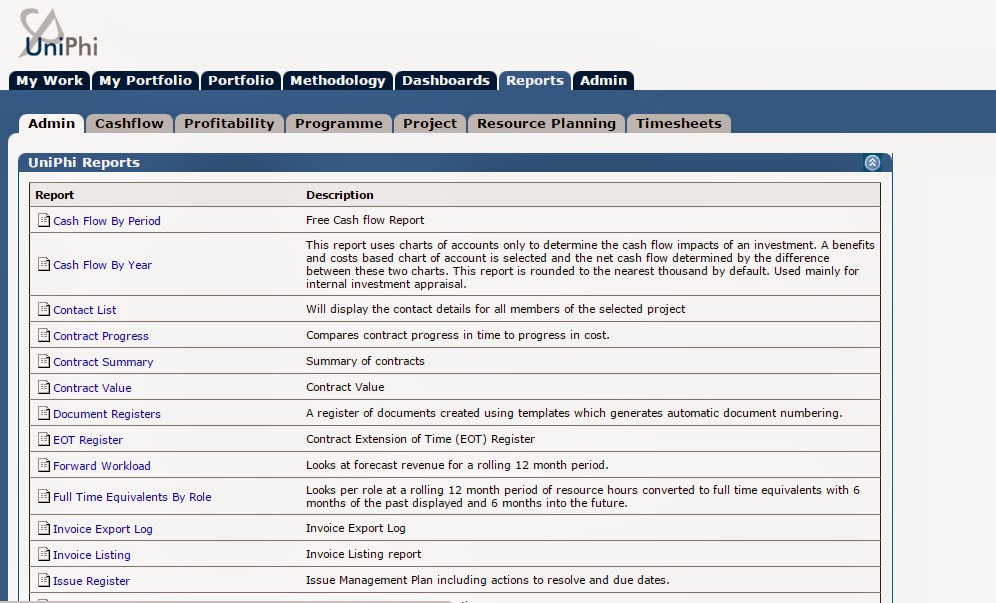UniPhi's Design Philosophy
It's often cited that the majority of projects fail. Statistics and indeed metrics vary, but it is common to hear of project failure rates when either delivering to scope, or delivering the promised benefits.
I read an article in the Business Journal on
Gallup.com titled
"The Cost Of Bad Project Management" In it the article states that only 2.5% of companies successfully complete 100% of their projects. This probably means that 97.5% or companies have no visibility of the projects that are currently undertaking, or that they have no ability to assess those "good ideas" and prioritize accordingly. Failure ensues.
Of course, the reasons that projects fail are also many and varied. Projects are by their very nature, complex beasts which require business and project teams to adapt and to be flexible. It's hard work, but that's part of the fun.. right?
At
UniPhi we have observed and assessed hundreds of projects, and concluded that the common theme in the majority of project failures is a lack of transparency and poor collaboration among project teams. Which is why we place these two aspects at the heart of our UniPhi project management software platform.
The newly released version of
UniPhi (
UniPhi 11) features some powerful new features, as well as some enhancement to the existing product. With the efficiency of YOUR business, and with our focus on enabling a transparent and collaborative environment in mind, I'd invite you to consider how these features and functions will help to put you into that 2.5% of companies that successfully deliver on their portfolio of projects.
SAVE AS DOCUMENT:
From the convenience of your Outlook inbox you can create a brand new document in UniPhi at the click of a button. Or, you can embed an email, along with its attachments straight into an existing document. Example applications of this functionality include; receiving a tender document via email. Using the Save as Document feature you can quickly and efficiently save the email and any attachments into a project in
UniPhi as a document. The document that is produced will of course meet your
corporate style guidelines, and align with your
project management methodology. Tracking and monitoring the progress of your tender document is now possible for everyone on the project.
Harness the richness of data that comes form
UniPhi's
distributed data capture methodology. As each member of your project team enters data into specific projects (creates a document, updates a task, adds a comment, emails a document) you will be able to view the information that they have created/updated. Of course UniPhi has always made it easy to find information via the documents tab, or the issues tab, for example. But now with the communications tab, finding any piece of project related information is entirely possible.
- The new Communications tab brings together all interactions and events into one place
- The Communications tab presents you with an almost unlimited number of options to filter for the exact piece or pieces of information you require.
- As well as the existing core
UniPhi filters, the communications tab has new filters which allow you to filter per specific role, per type of communication, and per category.
- A powerful extension to the existing set of filters in
UniPhi.
- Presents each and every custom drop down list that has been created via your Methodology tab.
- Filters can be defined and easily modified by you, as they are often unique to your organisation.
ACCOUNTING INTEGRATION:
- New and improved, seamlessly integrate your MYOB and Xero data with
UniPhi.
- The MYOB integration feature in UniPhi updated following the changes that MYOB have made to their software.
- Synchronisation options are now configurable and administrative from within the Admin/Accounting Integration tab.
Enhancements:-
Costs and Fees can be defined at the chart of accounts level, down to any level of detail you require. Just keep adding additional layers of cost/fees breakdown. Not only that, but you can specify numerous chart of accounts!
See screen shot above.
- Prompts you to enter your budget information at the level of detail specified via the Chart of Accounts- This effectively mitigates the risk that costs could all be grouped at the project level with no visibility or understanding of the assumptions that have been used to derive the budget amount.
- Use Excel to import and export project budget details.
- Determine which
contract deliverables to display on your output document.
- Greater flexibility when generating claims, or invoices.
- Identify the status of all invoices.
- Materials on Site, Extension of Time, and
Contract Adjustments available on Revenue contracts.
- See what timesheet deliverables relate to specific contract deliverables.
- Configurable presentation of information shown on Invoices or Progress Claims.
- Enter information at the Organisation level, and it will populate each of the Sites within the Organisation
- Portfolio Summary has two view options to display Financial or Portfolio information.
- Issue categories can be applied to specific criteria, such as Sector, Project Type, Service Line, and Location.
- And project lifecycle phases can be aligned with specific criteria, such as Sector, Project Type, Service Line, and Location
- Project custom fields phases can also be aligned with specific criteria, such as Sector, Project Type, Service Line, and Location.
- Define multiple project life cycles, and specify the type of
project the life cycle relates to.
- Configurable password policy, logging capability for failed logins, and ability to change your own password.
-
Issue details and issue summaries that appear in UniPhi
documents include the category that the issue relates to.
- Use external MS Word files as
UniPhi templates.
- Draft documents can have a watermark applied to them when they are rendered as a PDF document.
- Language translation can be applied across the entire system
- See the contracts Principal, and Supplier from the documents tab.
- Programme Contract Progress by Project report: contracts, deliverables, status, and claimed value.

- Improved Project Analysis
Report allows you to filter per role or per resource.
- Improved Project Analysis
Report now shows Profit in Period, and Profit Margin to Date.
- Project Cost Report Detail shows contract deliverables, and variations per chart of account code.
The Team at UniPhi hope you enjoy all of the exciting new features of UniPhi 11!














































.jpg)